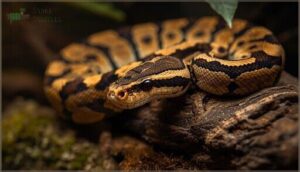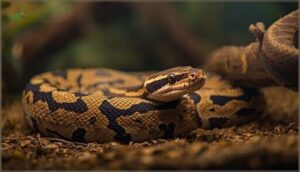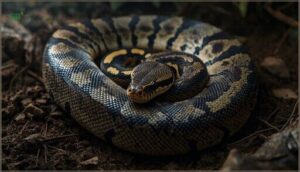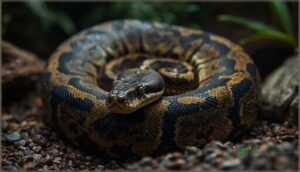This site is supported by our readers. We may earn a commission, at no cost to you, if you purchase through links.
That sharp exhale from your ball python’s enclosure isn’t cause for panic, but it definitely warrants attention. Ball pythons can and do hiss, using this forceful burst of air as their primary alarm system when something doesn’t feel right. Unlike the persistent wheeze of respiratory illness, a defensive hiss emerges as a single, deliberate sound—often your snake’s way of saying “back off” before resorting to more dramatic defensive displays.
This vocalization reveals important information about your python’s emotional state, from routine discomfort during handling to deeper issues with husbandry or health. Understanding what triggers this behavior, how to distinguish normal defensive hissing from warning signs of illness, and when intervention becomes necessary will help you provide better care while building a calmer relationship with your snake.
Table Of Contents
- Key Takeaways
- Can Ball Pythons Hiss?
- Why Do Ball Pythons Hiss?
- Is Hissing Normal in Ball Pythons?
- What Does Hissing Mean in Ball Pythons?
- When Are Ball Pythons Most Likely to Hiss?
- How to Tell if Your Ball Python is Hissing
- What Should You Do if Your Ball Python Hisses?
- How to Prevent Excessive Hissing
- When to Seek Veterinary Advice for Hissing
- Frequently Asked Questions (FAQs)
- What are some unusual behaviors that ball pythons have been observed exhibiting?
- What are some other odd snake behaviors that have been reported?
- How old was Sebastian when he was acquired, and how much did he weigh at that time?
- Can hissing damage a ball pythons throat?
- Do all ball python morphs hiss equally?
- Can ball pythons hiss while eating prey?
- Does hissing affect ball python breeding behavior?
- Will my ball python remember hissing episodes?
- Conclusion
Key Takeaways
- Hissing is a normal defensive behavior in ball pythons, not aggression—it’s their primary warning signal when they feel threatened, stressed, or uncomfortable, with frequency varying by individual temperament and life stage.
- Distinguish defensive hissing (single, forceful exhale during handling or stress) from respiratory illness (persistent wheezing, clicking, or gurgling at rest), as the latter requires immediate veterinary attention.
- Excessive hissing typically stems from environmental stressors like inadequate hides, improper temperature gradients, rough handling techniques, or high-traffic placement—fixing these conditions prevents most defensive responses.
- New snakes, juveniles, and pythons in shed cycles hiss more frequently due to heightened vulnerability, so minimize handling during acclimation periods and pre-shed phases to reduce stress-driven vocalizations.
Can Ball Pythons Hiss?
Yes, your ball python can absolutely hiss. This defensive behavior is completely normal in the species—they’re documented using audible hissing as their go-to response when feeling threatened or stressed, rather than striking. When disturbed, ball pythons usually curl into their signature protective ball and may hiss repeatedly if the disturbance continues.
It’s simply part of their natural communication toolkit, a way to say “back off” without resorting to aggression. Some individuals rarely hiss, while others do it frequently, reflecting normal personality variation within ball python behavior.
Understanding their natural habitat needs is essential for providing a suitable environment that minimizes stress and hissing.
Why Do Ball Pythons Hiss?
When your ball python hisses, it’s not being dramatic—it’s communicating something specific. These snakes don’t vocalize often, so when they do, there’s usually a clear reason behind it.
Let’s look at the main triggers that cause ball pythons to hiss.
Stress and Fear Triggers
Fear responses in ball pythons stem from perceived threats that activate their instinct to warn or flee. Stress and fear are the most common triggers for hissing, especially when your snake feels cornered or unsafe. Environmental stress, improper handling techniques, and noise sensitivity can all push your ball python into defensive mode, signaling distress through audible hissing and tense body language.
Common stress and fear triggers include:
- Sudden movements or reaching into the enclosure too quickly, which your snake interprets as an incoming predator
- Loud noises, vibrations, or high-traffic areas near the enclosure that create persistent environmental stress
- Gripping too tightly or restraining during handling, limiting your snake’s ability to move freely
- Relocation to unfamiliar surroundings—over 64% of newly acquired ball pythons show increased defensive behaviors within the first two weeks
- Inadequate hiding spots or incorrect temperature gradients that leave your snake feeling exposed and vulnerable
Understanding proper handling techniques is vital to minimize stress and fear responses in ball pythons.
Defending Territory
While stress often triggers hissing, ball pythons also defend territory—particularly around their hides, enclosures, and nesting sites. A 2021 ethological study documented that defensive hissing paired with an S-shaped posture functions as a primary territorial warning when keepers approach the snake’s space. Gravid females guarding eggs hiss more intensely when hands enter nesting zones, signaling a protective, context-specific threat response.
| Territorial Trigger | Hissing Context | Management Strategy |
|---|---|---|
| Enclosure intrusion | Hissing when hands reach into tub or hide | Provide multiple secure hides to reduce perceived invasion |
| Egg guarding | Intense hissing and striking near clutch | Use tools or shields during egg checks; expect increased defensiveness |
| Barren setups | Frequent hissing at front glass or doors | Add clutter, visual barriers, and 4+ inches of substrate for security |
| Sudden disturbance | Repeated hissing without striking when cornered | Limit direct interference; allow predictable, gentle interactions |
| Lack of hiding spots | Defensive posture and hissing during routine maintenance | Install warm- and cool-side hides; maintain stable thermal gradients (88–90°F warm, 72–80°F cool) |
When you minimize perceived threats—avoid tapping glass, sudden movements, or repeatedly removing hides—you’ll reduce the full defensive sequence, including territorial hissing aimed at protecting your snake’s immediate space.
Aggression or Annoyance
Beyond territorial defense, your ball python may hiss simply because it’s annoyed—not aggressive in the strict sense. Keepers report snakes hissing after repeated handling attempts, slithering normally yet signaling “I’ve had enough.” This annoyance hissing lacks the S‑shaped coil and rigid strike-ready posture of true defensive behavior.
Recognize these annoyance signs and stress signals early, and you’ll prevent escalation into genuine fear responses.
Is Hissing Normal in Ball Pythons?
Yes, hissing is completely normal in ball pythons—it’s one of their primary defense mechanisms when they feel threatened or uncomfortable. That said, the frequency and intensity of hissing can vary quite a bit depending on your snake’s age, temperament, and past experiences.
Let’s look at what’s typical and when you might expect to hear your ball python hiss.
Frequency of Hissing
How often should you expect hissing? In well-maintained captive environments, ball pythons rarely vocalize defensively—research shows hissing patterns remain virtually undetectable when environmental factors minimize stress triggers.
Your snake’s individual hissing thresholds depend on housing quality, handling consistency, and whether fear or stress escalates beyond their comfort zone.
Think of ball python behavior as a calm default; frequent hissing signals something’s wrong, not typical snake behavior.
Hissing in Baby Ball Pythons
Juvenile ball pythons hiss far more frequently than adults, especially during their first weeks in a new enclosure. Your baby ball python may tense, coil tightly, and produce sharp hisses almost every time you approach—this defensive mechanism reflects acute fear rather than aggression.
With calm, brief handling sessions repeated over several days, most babies gradually reduce this stress-driven snake behavior as they acclimate to environmental factors and routine care.
Individual Personality Differences
Temperament traits in ball pythons vary widely—some snakes show consistent boldness, while others remain persistently shy across different contexts. Recent studies reveal stable behavioral flexibility and social motivation differences that shape how individual animals respond to handling and environmental changes.
Here are some key findings:
- Shyness–exploration axis: Individual ball pythons display twofold differences in exploratory behavior, with some consistently remaining in shelter while others actively explore open areas across repeated trials.
- Social location variation: In group settings, certain snakes consistently occupy central aggregate locations while others remain on the periphery, demonstrating variable social motivation.
- Stress physiology links: More reactive individuals show higher fear-based aggression scores and stronger hormonal responses during confinement stress, reflecting endocrine profiles tied to defensive behavior.
- Contextual behavior shifts: Some ball pythons express different hissing thresholds depending on whether they’re alone or in groups, showing that personality doesn’t always predict responses uniformly across situations.
Your ball python’s hissing frequency may simply reflect its position along this natural temperament spectrum rather than indicating illness or poor husbandry.
What Does Hissing Mean in Ball Pythons?
When your ball python hisses, it’s basically speaking to you in the only language it has. This vocalization isn’t random—it carries specific meaning that helps you understand what’s going on in your snake’s world.
When your ball python hisses, it’s speaking the only language it has—and that sound carries specific meaning about what’s happening in its world
Let’s look at the three main messages your ball python is trying to communicate when it hisses.
Warning Signals to Predators
When your ball python hisses, it’s channeling an ancient survival strategy—a defensive behavior designed to scare off predators before any physical confrontation occurs. This warning signal is the snake’s way of saying “back off” without wasting energy on biting or striking.
By expelling air forcefully through the glottis, your python creates an abrupt, startling sound that makes potential threats think twice, giving it precious seconds to coil into a protective ball or retreat to safety.
Communication of Discomfort
Hissing isn’t just a warning to predators—it’s your ball python’s way of telling you something’s wrong. When you see defensive behaviors like recoiling, flattening, or retreating alongside vocalization patterns, these discomfort signals reveal stress responses tied to handling, temperature shifts, or environmental cues.
Think of it as snake behavior and communication in its most direct form: your python is asking for relief from whatever fear or stress it’s experiencing right now.
Response to Handling or Environment
Your ball python’s hissing often traces directly back to how you handle it or what’s happening in its enclosure. Environmental triggers—sudden temperature drops, insufficient hides, or excessive vibration—combine with handling techniques like gripping too tightly or approaching from above to spark defensive vocalization.
Stress reduction starts with habitat design that offers security and behavioral cues you can read before the hiss even begins.
When Are Ball Pythons Most Likely to Hiss?
Ball pythons don’t hiss randomly—they usually reserve this behavior for specific situations when they feel vulnerable or unsettled. Understanding when your snake is most likely to hiss can help you anticipate and address potential stressors before they escalate.
Let’s look at the three most common scenarios that trigger defensive hissing in ball pythons.
During Shedding Cycles
The pre-shed period often brings a short-lived personality shift. Your snake’s clouded vision and tight, uncomfortable skin trigger increased defensiveness, making hissing during this vulnerable window completely expected.
Humidity levels below 60% worsen skin irritation and heighten stress-driven reactions.
When you see those milky-blue eyes, it’s your cue to pause handling techniques entirely—your Ball Python isn’t being aggressive, just asking for space during this sensitive phase of shedding.
When Sick or Injured
Illness transforms your normally docile Ball Python into a defensive sentinel. Respiratory issues produce wheezing or clicking alongside hissing, while pain signals from injury prompt sharp vocalizations when you handle affected areas.
Watch for health indicators like lethargy, refused meals, or abnormal posture paired with increased hissing—these combinations demand veterinary care. When discomfort drives the behavior, your snake’s hissing is less about attitude and more about survival, signaling that something’s genuinely wrong.
In New or Stressful Environments
Moving your Ball Python to a new enclosure triggers heightened defensiveness for 7–14 days—a period when environmental acclimation takes priority over interaction. Novel environments flood your snake with unfamiliar smells, lighting patterns, and sounds, amplifying stress and hissing frequency.
Proper handling techniques mean waiting until your python accepts 2–3 consecutive meals before regular interaction, allowing natural stress reduction through stable acclimation periods rather than forced familiarity.
How to Tell if Your Ball Python is Hissing
Recognizing true hissing in your ball python isn’t always straightforward, especially since other sounds and behaviors can look similar at first glance.
You’ll want to distinguish between a defensive hiss and concerning respiratory noises, while also watching for the physical cues that accompany the sound.
Here’s what to look for when determining if your snake is actually hissing.
Hissing Sounds Vs. Wheezing
Your ball python’s respiratory health depends on distinguishing normal hissing from pathological wheezing. A defensive hiss produces a single, forceful exhale—brief, loud, and context-driven during handling or stress. Wheezing, however, presents as repetitive whistling, gurgling, or crackling synchronized with each breath, often audible at rest.
Sound patterns matter: acoustic analysis reveals that wheezing persists across multiple breathing cycles, signaling potential respiratory compromise requiring veterinary attention.
Body Language and Posture
When your ball python hisses, watch for defensive posturing that reveals its stress level. Coiling behavior shifts from loose, relaxed drapes to tight, rigid loops—classic thigmotactic preferences for security.
Head positioning matters: an S-curved neck with direct gaze signals strike readiness, while tucking the head under coils indicates fear.
Muscle tension transforms supple coils into firm, springy bands, distinguishing genuine alarm from calm curiosity in this defensive mechanism.
Recognizing Other Stress Signs
Beyond the hiss itself, your ball python’s welfare concerns emerge through subtle stress signals. Watch for appetite shifts—over half of captive snakes refuse food when environmental factors aren’t right.
Excessive daytime activity or, conversely, complete shutdown with prolonged hiding both flag distress.
Incomplete sheds, visible weight loss, and persistent escape attempts along enclosure walls reveal that stress management and fear are affecting your snake’s health indicators and overall behavior.
What Should You Do if Your Ball Python Hisses?
When your ball python hisses, your first priority is to understand what’s triggering the behavior and respond in a way that reduces stress rather than escalating it. The right approach depends on reading your snake’s body language, adjusting how you interact, and knowing when to step back.
Here’s what you should do in the moment and how to handle your snake moving forward.
Immediate Steps to Take
When your ball python hisses, stop handling immediately. This Handling Pause is the cornerstone of Stress Reduction and effective Animal Stress Management. Place your snake back in its enclosure gently, then step back.
Next, conduct an Environmental Check: scan for loud noises, bright lights, or vibrations that may have triggered the Hissing Response. These Safety Measures protect both you and your ball python while addressing the root cause of stress.
Adjusting Handling Techniques
Gentle Handling starts with rethinking your approach. Instead of gripping your Ball Python tightly, support its body across both hands, allowing it to move freely—this Predictable Movement reduces the Hissing and Stress you’ve been seeing.
- Approach from the side, never directly overhead, to avoid triggering predator-avoidance responses
- Keep sessions under 15 minutes to prevent elevated stress markers
- Support at least two body loops to minimize escape behaviors and defensive postures
This Calm Approach respects your snake’s Animal Behavior while building trust.
Giving The Snake Space
Sometimes the most effective response is no response at all—your Ball Python needs a Snake Sanctuary where it can decompress without Handling. After Hissing, stop all interaction for 24 to 48 hours, honoring its Space Requirements and allowing stress hormones to return to baseline.
This Environmental Enrichment includes undisturbed hides and minimal enclosure disturbance, respecting Animal Behavior that signals Stress Reduction through withdrawal and self-regulation.
How to Prevent Excessive Hissing
Prevention is always more effective than intervention regarding hissing behavior in ball pythons. By addressing the underlying causes before they escalate, you can create an environment where your snake feels secure and comfortable.
The following strategies focus on three key areas that directly influence your ball python’s stress levels and overall well-being.
Reducing Environmental Stressors
Your ball python’s enclosure design directly shapes its stress levels and hissing behavior. Research shows that rack-housed snakes display far more stress-related activity than those in enriched terraria, with proper thermal gradients, humidity control, and environmental enrichment serving as cornerstones of animal welfare.
- Provide enclosures longer than your snake’s body length to support natural stretching and exploration
- Maintain thermal gradients with hotspots around 88–92°F and cool zones at 78–80°F for ideal thermoregulation
- Keep humidity consistently between 60% and 70% using reliable hygrometers checked daily
- Offer multiple secure hides and visual barriers to reduce chronic stress monitoring by your snake
- Add climbing branches, varied substrates, and interactive objects to prevent boredom-related behaviors
Consistent stress monitoring of these environmental parameters prevents the majority of defensive hissing episodes in ball pythons.
Proper Handling Practices
How you pick up and support your ball python matters just as much as where you keep it. Approach from the side—never overhead like a predator—and scoop the mid-body with both hands, keeping at least two points of contact at all times. Avoid gripping the neck or head, which triggers defensive hissing.
Let your snake glide over your arms rather than pinning it, and limit sessions to 10–15 minutes several times weekly during initial acclimation to reduce stress-related vocalizations.
Maintaining Ideal Enclosure Conditions
Enclosure design directly determines how secure your ball python feels day to day. Here’s what stable conditions look like:
- Temperature Control: Maintain warm-side ambient at 88–92°F and cool-side at 75–80°F using digital thermometers for accuracy.
- Humidity Levels: Keep relative humidity at 60–80% with moisture-retentive substrate options like coco husk.
- Lighting Systems: Provide a consistent 12-hour photoperiod to support natural circadian rhythms in your reptile care routine.
When to Seek Veterinary Advice for Hissing
Most of the time, hissing is just your ball python’s way of saying “back off”—nothing to worry about.
But sometimes, that sound isn’t a hiss at all, and what looks like defensiveness might actually be a sign something’s wrong with your snake’s health.
Let’s talk about when you should pick up the phone and call your reptile vet.
Signs of Illness Vs. Normal Hissing
Distinguishing normal hissing from illness in your ball python hinges on context and accompanying signs. Healthy defensive hissing occurs during handling or sudden disturbances, then stops—your snake resumes normal activity, appetite, and posture.
If hissing persists at rest, joins lethargy, weight loss, or abnormal breathing patterns, you’re seeing stress signals and health indicators that point toward systemic reptile health concerns requiring veterinary attention.
Respiratory Infection Warning Signs
When breathing issues accompany hissing, you’re facing potential upper respiratory infections requiring urgent attention. Respiratory symptoms in ball pythons differ sharply from defensive hissing—infection signs demand disease prevention through health monitoring and prompt veterinary care.
Watch for these critical respiratory infection warning signs:
- Mucus or bubbles around nostrils and mouth—clear, bubbly discharge signals infection
- Wheezing, clicking, or whistling sounds during breathing—audible beyond normal hissing
- Open-mouth breathing or elevated head posture at rest—severe respiratory distress indicators
Importance of Regular Health Checks
Even when your ball python isn’t hissing, annual wellness exams catch hidden problems before they escalate. Reptiles mask illness remarkably well—parasites, subclinical infections, and husbandry gaps often surface only during health screening.
Preventive measures through regular veterinary care reduce emergency visits, support early disease detection, and keep your pet snake thriving. Schedule yearly checkups to safeguard reptile health and wellness long-term.
Frequently Asked Questions (FAQs)
What are some unusual behaviors that ball pythons have been observed exhibiting?
Ball pythons show surprising social grouping—repeatedly choosing to co-shelter with others even when individual hides are available.
They’ll also climb, burrow, and bathe when environmental enrichment allows, demonstrating expanded locomotion beyond simple crawling.
What are some other odd snake behaviors that have been reported?
You’d be surprised how inventive snakes can be. Beyond typical defenses, researchers have documented thanatosis behavior in hog-nosed species, gliding mechanics in flying snakes, and even complex hunting strategies involving social grouping in Cuban boas.
How old was Sebastian when he was acquired, and how much did he weigh at that time?
Sebastian was usually acquired around 2 months old as a juvenile ball python, weighing between 100 and 200 grams—ideal for ensuring healthy juvenile development and easier handling during his early growth stages.
Can hissing damage a ball pythons throat?
No, normal defensive hissing won’t damage your ball python’s throat. The glottis and tracheal cartilage are built to handle forceful exhalation safely. Frequent hissing signals stress, not respiratory injury itself.
Do all ball python morphs hiss equally?
Here’s the truth: while genetics shape temperament—accounting for 20–50% of behavioral variation—environmental factors, handling history, and individual personality influence hissing patterns far more than morph alone.
Can ball pythons hiss while eating prey?
Yes, ball pythons can hiss while eating prey. They may hiss before striking or when disturbed during feeding, combining defensive mechanisms with prey response. Heightened respiratory activity and stress sensitivity make hissing more likely around meals.
Does hissing affect ball python breeding behavior?
Hissing signals stress, and stress hormones can suppress reproductive function in reptiles. Chronic defensive behavior may reduce breeding success, but occasional hissing during courtship or disturbance usually doesn’t impair mating behavior or reproductive health.
Will my ball python remember hissing episodes?
Your ball python can retain memories of stressful hissing episodes for days to weeks through recognition ability and learning behavior. Stress impact influences memory retention, but proper habituation processes reduce defensive responses through consistent, gentle handling over time.
Conclusion
Your ball python’s hiss might sound alarming, but it’s actually a measured response—a clear-headed warning rather than a sign of aggression. Whether you’re dealing with a defensive juvenile or a usually docile adult suddenly vocalizing, the answer lies in reading context: body language, husbandry conditions, and timing all tell the story.
When you can distinguish normal defensive behavior from respiratory distress, you transform that sharp exhale into actionable information, strengthening both your snake’s wellbeing and your confidence as a keeper.
- https://gradcoach.com/research-topics/
- https://www.thesprucepets.com/reasons-why-snakes-hiss-5215794
- https://ball-pythons.net/forums/showthread.php?57803-My-ball-python-is-hissing-at-me!
- https://www.justanswer.com/pet-reptile/n7xh1-ball-python-hissed-nothing-earlier-not-leaving.html
- https://vetmed.tamu.edu/news/pet-talk/reptile-emotions/

















